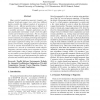Free Online Productivity Tools
i2Speak
i2Symbol
i2OCR
iTex2Img
iWeb2Print
iWeb2Shot
i2Type
iPdf2Split
iPdf2Merge
i2Bopomofo
i2Arabic
i2Style
i2Image
i2PDF
iLatex2Rtf
Sci2ools
112
click to vote
PARELEC
2002
IEEE
2002
IEEE
Dynamic Process Partitioning and Migration for Irregular Applications
Many practical applications generate irregular, nonbalanced divide-and-conquer trees which have different depths, possibly also different numbers of successors at different levels. Efficient parallelization is difficult as it requires dynamic partitioning and mapping of such trees to available processors. Irregular applications can obtain unpredictable intermediate results which then affect creation and termination of processes. The new proposed C++ framework called DAMPVM/DAC offers a combined scheme of dynamic process/data partitioning and migration which enables automatic parallelization of irregular divideand-conquer applications taking into account processor speeds, network status, changing application requirements as well as external load introduced by other users. Experiments on a network of workstations include adaptive integration with and without process migration as well as static and dynamic codes for image recognition. The latter ones enable to assess both the overhead ...
Distributed And Parallel Computing | Dynamic Partitioning | Irregular Divideand-conquer Applications | Many Practical Applications | PARELEC 2002 |
Related Content
| Added | 15 Jul 2010 |
| Updated | 15 Jul 2010 |
| Type | Conference |
| Year | 2002 |
| Where | PARELEC |
| Authors | Pawel Czarnul |
Comments (0)

